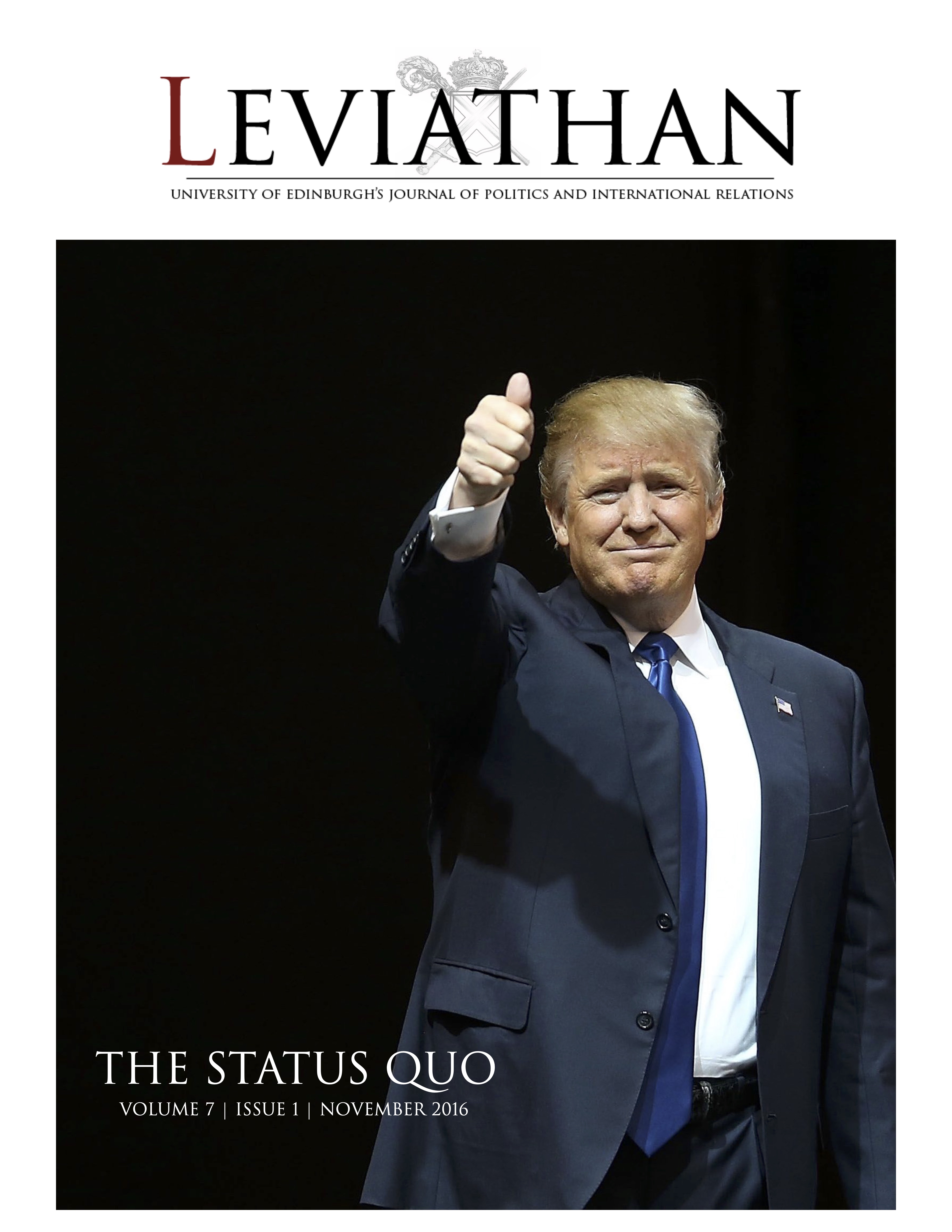
Welcome to Issue I, Volume VII of Leviathan.
It is with great pleasure that I present to you an issue on ‘The Status Quo’. This issue explores how the existing state of affairs is being actively maintained and challenged in numerous domains, and the implications of these challenges.
The surprise election of Donald Trump as President of the United States just a few weeks ago represents one of the most widely covered—and perhaps most influential—challenges to the status quo. As such, the cover photo for this issue depicts Mr. Trump, as he has come to represent a physical manifestation of discontent with the existing state of affairs in American politics.
Yet the factors which contributed to the election of Mr. Trump are not unique. As the articles in this issue demonstrate, the discontent of citizens with the manner in which their country is run is quickly becoming a worldwide phenomenon. Several writers examine the rise of those who feel their government does not adequately represent them, or that the existing order does not benefit them. Alexander Brotman examines the influence of reactionary politics on upcoming French elections, and Sofiane Aklouf profiles the resulting growth in popularity of Marine Le Pen and Le Front National. However, Sam Taylor illustrates an alternative approach to discontent in his profile of Jill Stein, analysing the reasons why people vote for third party candidates—and why these candidates run—despite low chances of electoral success. Similarly, in the Latin America and Caribbean section, Mark Wilson argues that the Columbian people were justified in voting against a government deal, as Columbia counter-intuitively risks perpetuating the violent status quo by pursuing a sub-standard peace accord.
Moreover, recent challenges to the existing state of affairs have not been confined to national politics. Bernard Lluminca analyses Germany’s concurrent desire to maintain their international status as the leading power on the continent while also weathering domestic emotional and cultural crisis brought on by the massive influx of migrants. This issue also features an entertaining and thought-provoking point-counter point argument conducted between Jeff Justice, a former professor, and Camilla Hallman, an undergraduate, regarding the future of liberal democracy as the dominant form of government.
Additionally, some writers chose to focus on more positive implications of challenges and changes to the status quo. In the Middle East and North Africa section, Samin Ahbab argues the power of online education has the capacity to reinvigorate stagnant education efforts in Egypt, Lebanon, and Algeria. Controversially, writer Jordan Lee defends the rise of the populist left in Europe as a legitimate challenge to a broken political system, and Samuel Phillips postulates a ‘Post-Karimov’ Uzbekistan. Finally, two writers focus on how migration can beneficially alter the status quo. Sophie Waters examines how the empowerment of the Eritrean diaspora is contributing to the disintegration of an oppressive regime, and Soleil Westendorf analyses the importance of Costa Rica to Latin American asylum seekers.
Let me conclude by offering massive thanks to my Deputy Kanzanira Thorington, my Production Chief Betzy Hänninen, and the entire Leviathan staff, without whom publishing this issue would not have been possible. I would also like to thank Darya Gnidash and the Edinburgh Political Union, as well as Dr. Ailsa Henderson and Dr. Sara Dorman of the School of Social and Political Science, for their continued advice and support.
It is with excitement that I also announce that, for the first time, Leviathan will be accepting Letters to the Editor to be published in our next issue. I would encourage each of you check our newsletter and social media accounts for information regarding the next theme, and to learn more about submitting letters. If something in this issue strikes a chord with you, or if you disagree with a point here, send us your argument in less than 500 words, and we may choose to publish it in the next issue. The deadline for both Articles and Letters to the Editor for Issue II will be 31 January 2017. We look forward to reading your submissions.
I hope each of you finds this issue as timely and thought-provoking as I did. Sincerely,
Nicholas G. Pugh
Editor-in-Chief


